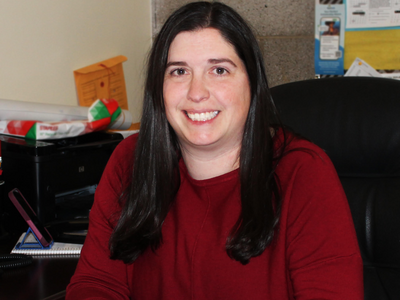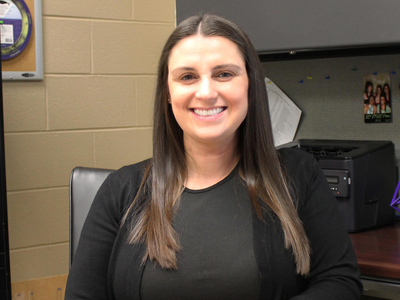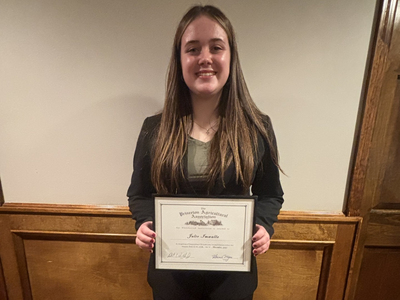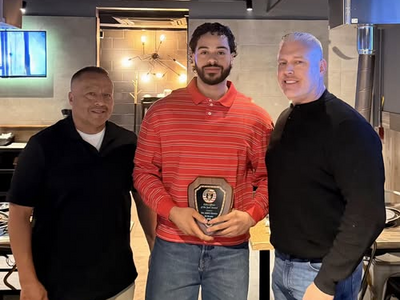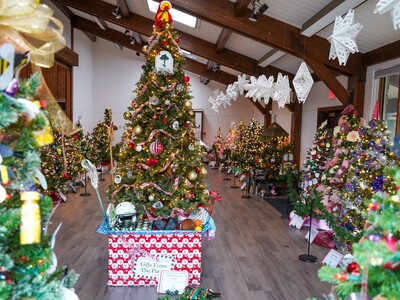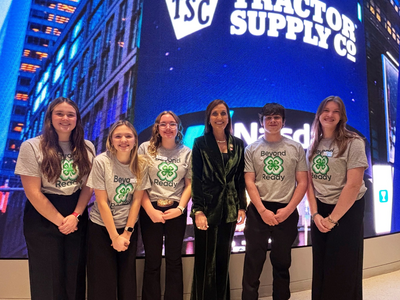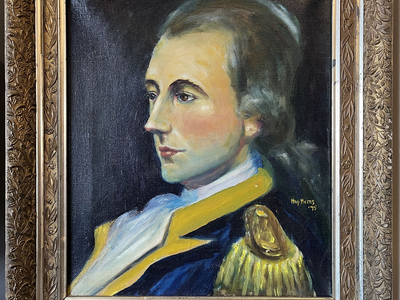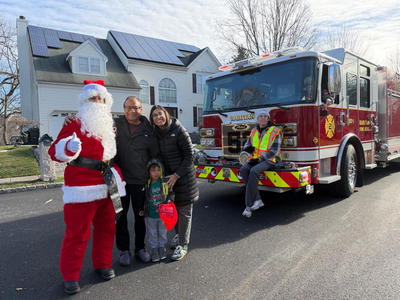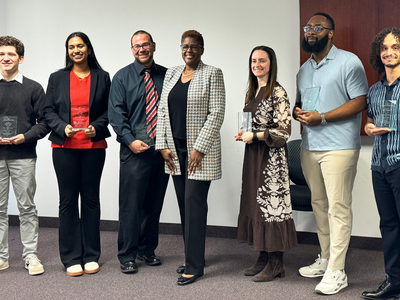As civic knowledge declines, programs work to engage young people in democracy
Republished with permission as part of the Democracy Now Initiative
Story by Delaney Chase and Emily Richardson
Photos by Hudson French, Hannah Lee, Emily Richardson and Joshua Harrison-Williams
NEW YORK – Flanked by stained-glass windows, 54 New York City high school students challenge one another to imagine an ideal democracy.
Wood-paneled walls are covered in haphazardly taped posters that students worked together to create. Ideas are written in Crayola marker under categories such as “rights” and “responsibilities.” Some posters are divided down the middle by an imperfect line, separating the students’ hopes and fears for democracy’s future.
On one side, their hopes. A free and fair process that works for the people. Lack of judgment toward different ideas and choices. Younger generation participates in democracy to keep it alive.
On the other side, their fears. More partisanship, further political divide. Inequitable representation of marginalized groups. Too many old people.
This is the third year of YVote’s Democracy Camp, held at the New York Society for Ethical Culture’s meeting house. The century-old limestone building faces Central Park.
After a day interviewing passersby on city streets and exploring issues such as mental health and fair education, a high school leader asks her fellow students to think about a question: “What is my role in an ideal democracy?”
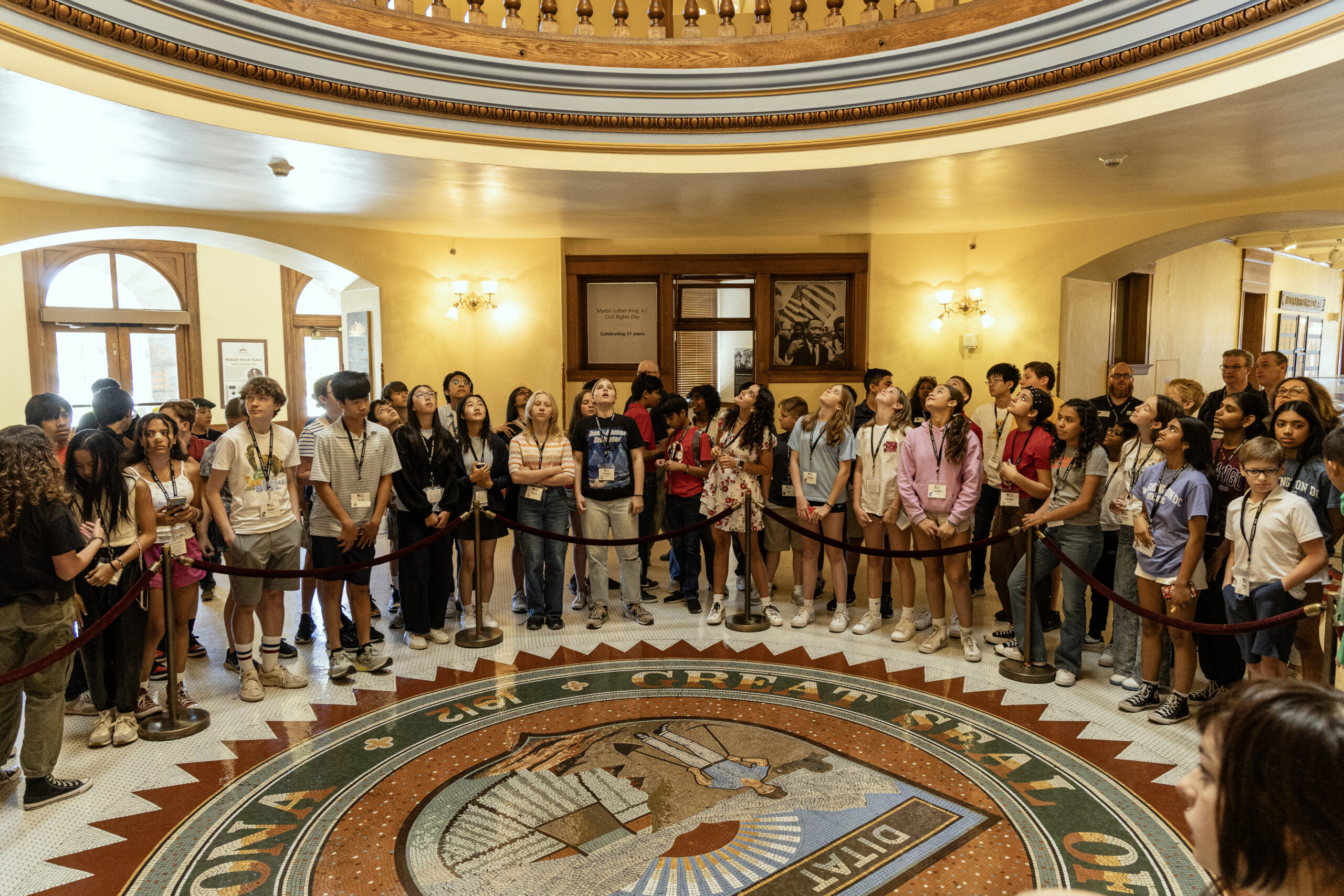
Camp O’Connor USA participants visit the Arizona Capitol Museum in Phoenix on June 11, 2024. (Photo by Emily Richardson/News21)
‘The lies and the truth’: Misconceptions about Gen Z
Collective anxiety around youth engagement in civic life lurks like a bogeyman in society’s nightmares.
Voter turnout among Generation Z – which demographers generally define as those born from 1997 to 2012 – has historically been low. In the 2022 midterm elections, only one in every 10 voters nationwide was 18 to 29 years old, according to the Pew Research Center. A June Marist survey predicts about 67% of registered Gen Zers and Millennials combined will vote this November. That’s compared with 94% of Baby Boomers.
Young people often don’t feel they know enough to vote, experts say, and believe political leaders neglect the issues that matter to them, such as climate change and gun violence. And older generations too often condescend.
“They think we don’t care at all about the political climate of America,” says 16-year-old Heba Elkouraichi, a 2023 YVote camper who helped plan this year’s program. “But in reality, we just don’t feel included. We feel that we’re not represented, either.”
Mistrust is a factor, too. Just 20% of 18- to 29-year-olds say they trust Congress, and only 30% say they trust the office of the president, according to a report from CIRCLE – the Center for Information & Research on Civic Learning and Engagement at Tufts University.
“It’s kind of hard to differentiate between the lies and the truth,” says 16-year-old Olivia Cisse, a YVote camper. “The lies kind of mess up the faith that you have in the government.”
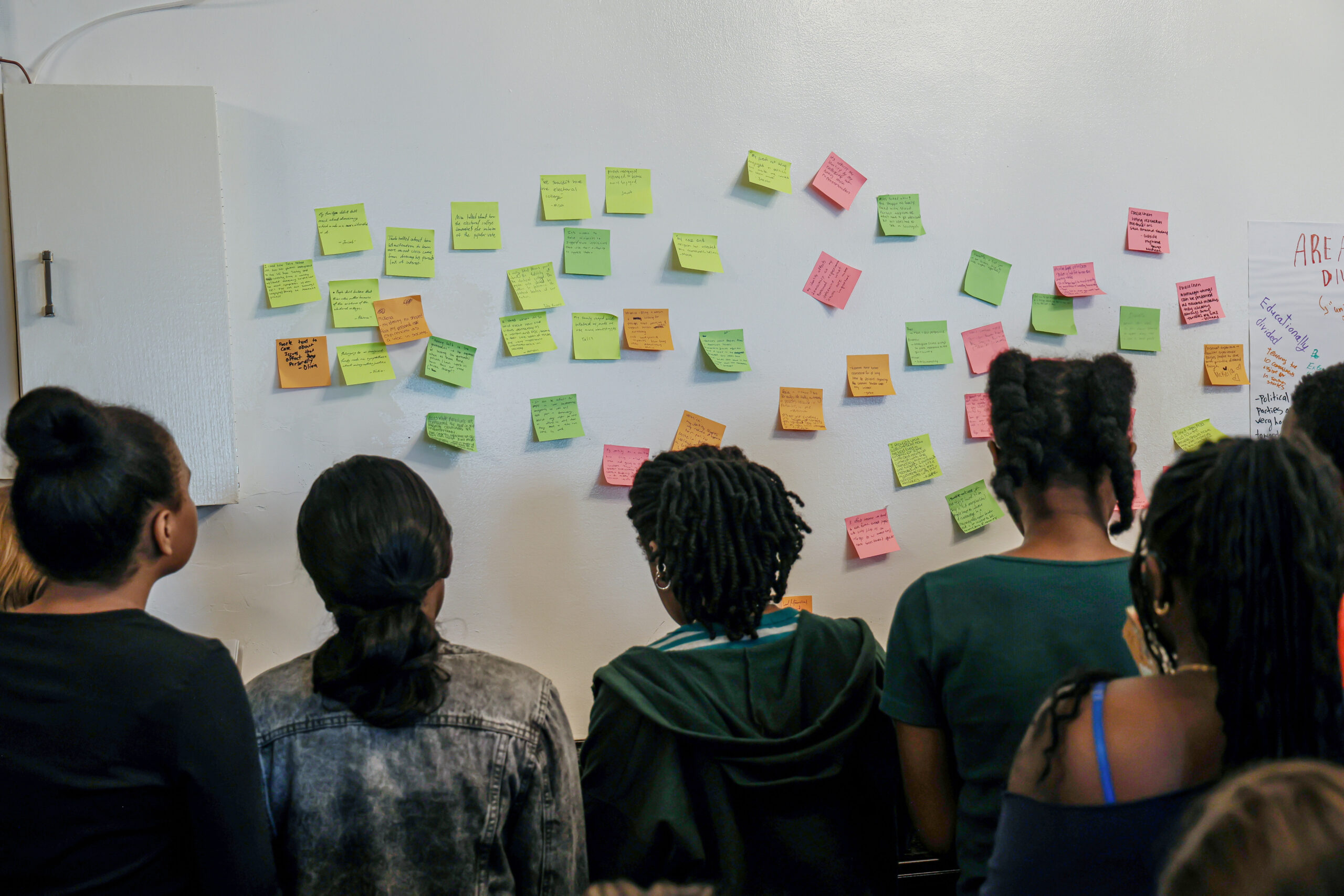
High school students participating in YVote’s Democracy Camp look at a wall of sticky notes in New York on July 1, 2024. The core premise of the camp is that democracy is flawed – and young people have a duty to help fix it. (Photo by Emily Richardson/News21)
The debate over Gen Z’s engagement levels comes at a time when civics knowledge among Americans as a whole has plunged to new lows: A 2023 survey by the Annenberg Public Policy Center found 66% of respondents could name all three branches of government, but 17% could not name any. And just 5% of respondents could name all five freedoms covered by the First Amendment.
Educators see civics programs for students and teachers as a guidepost for democracy.
“Every scientist, every doctor, every nurse, every teacher, every brick mason – every person – has a civic duty to our democracy and our republic,” says Robbie Pelkey, who teaches social studies at Plainfield High School, southwest of Indianapolis. “This is the most important subject that every American should understand.”
‘Anyone can play a role’
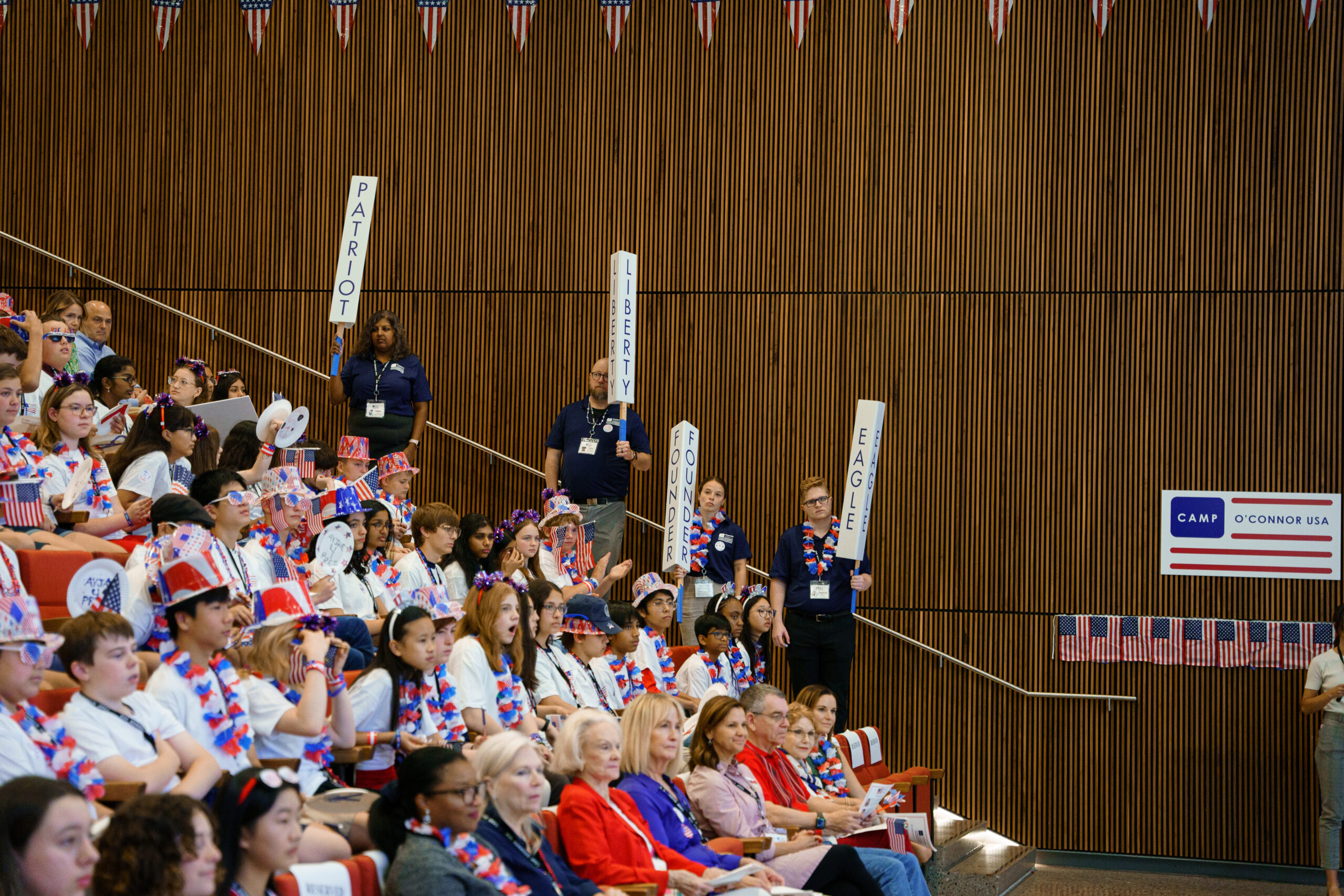
Camp O’Connor students and staff participate in the closing ceremony on June 14, 2024, at the Sandra Day O’Connor College of Law in Phoenix. The camp is one of several programs working to engage young people in democracy. (Photo by Hudson French/News21)
At Camp O’Connor USA in Phoenix, students learn about the concrete and mortar that support America’s foundation.
The chatter of seventh and eighth graders rises inside a law school named for the nation’s first female U.S. Supreme Court justice. Soon, the students crowd into buses taking them from Arizona State University’s Sandra Day O’Connor College of Law to the governor’s office.
There, the most courageous among them pull questions from a paper bag and read them aloud: What inspired you to run for office? What advice do you have for young people who want to run for office someday? What is the most challenging part of your job?
Gov. Katie Hobbs replies with the aplomb of a practiced politician and, later, poses for a photo with the group.
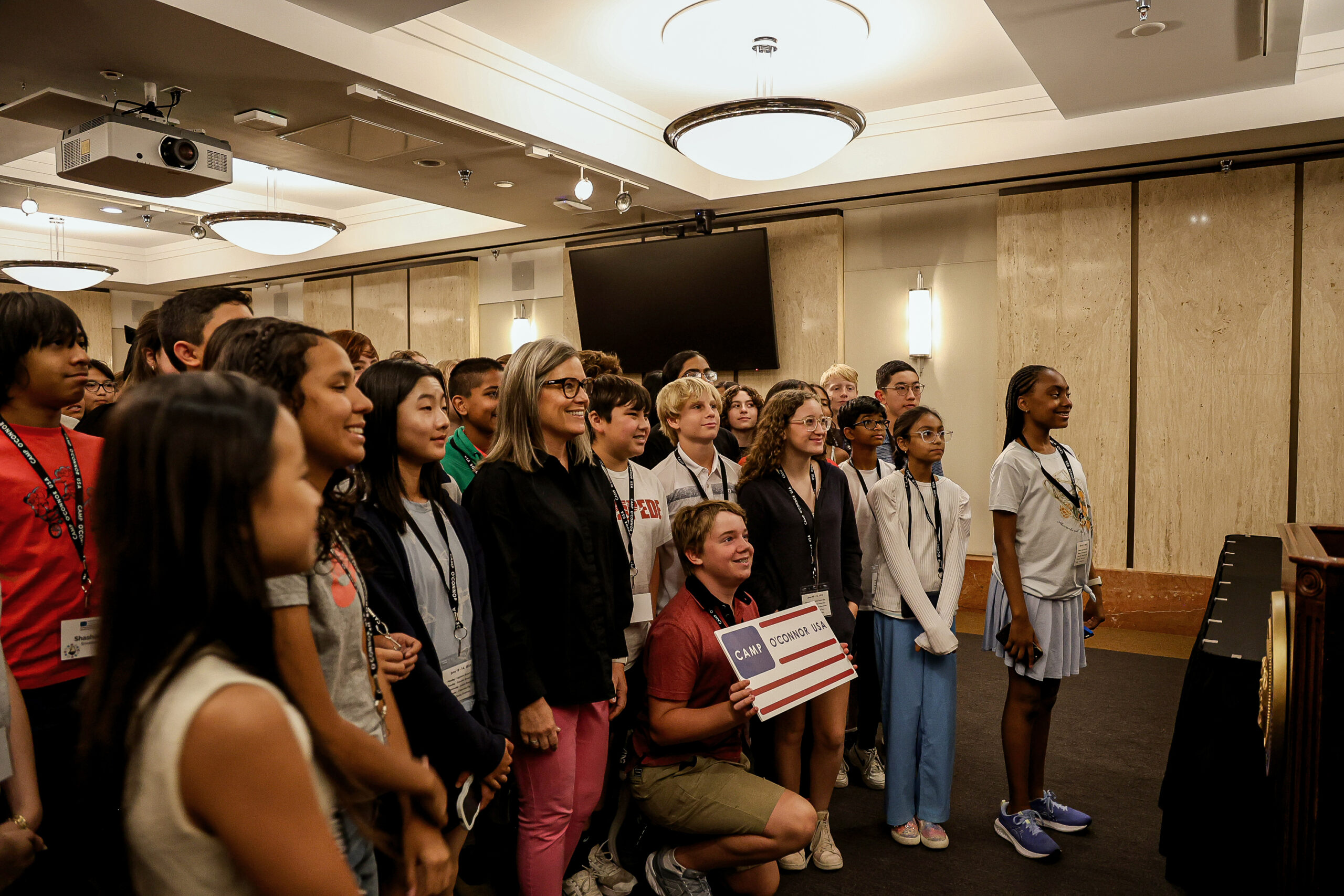
Camp O’Connor participants pose for a photo with Arizona Gov. Katie Hobbs on June 11, 2024, in Phoenix. Thirteen-year-old Ziora Obuekwe of Windsor, Connecticut, stands at the far right. She says “anyone can play a role” in democracy. (Photo by Emily Richardson/News21)
Ziora Obuekwe, a 13-year-old from Windsor, Connecticut, doesn’t ask a question. But she works her way to the front of the group for the photo op, posing with quiet confidence.
Later, she says, “We got to talk to some very important people.”
Camp O’Connor takes students on a five-day journey through the workings of the executive, legislative and judicial branches of government, complete with field trips to the state Capitol, Supreme Court and governor’s office, along with the county elections department.
The lessons pair the serious with the playful.
On “Citizenship Day” during this year’s camp in June, participants visit the Maricopa County Recorder’s Office, which oversees elections in the nation’s fourth-largest county by population. They cast mock ballots made to look like the real thing, voting on questions such as which celebrity they would prefer as a teacher. (Dwayne “The Rock” Johnson beat Taylor Swift in a surprising upset.)
The camp is part of a slate of educational programs at the Sandra Day O’Connor Institute for American Democracy, founded by the late justice in 2009.
“What the justice says is that you have to understand how your government works, because it’s complicated, and then you have to understand how you engage in it,” says Ben Maynard, director of civics education at the institute.
The camp launched in 2016 with 48 students. This year, 100 attended from places big and small, near and far. Obuekwe, just a few years out from casting her first ballot, is among 34 out-of-state campers.
“I think anyone can play a role,” she says, “no matter how young they are – just getting engaged in democracy and government, just learning about it so when you’re old enough to vote, you can make a difference and make an impact on the leaders.”
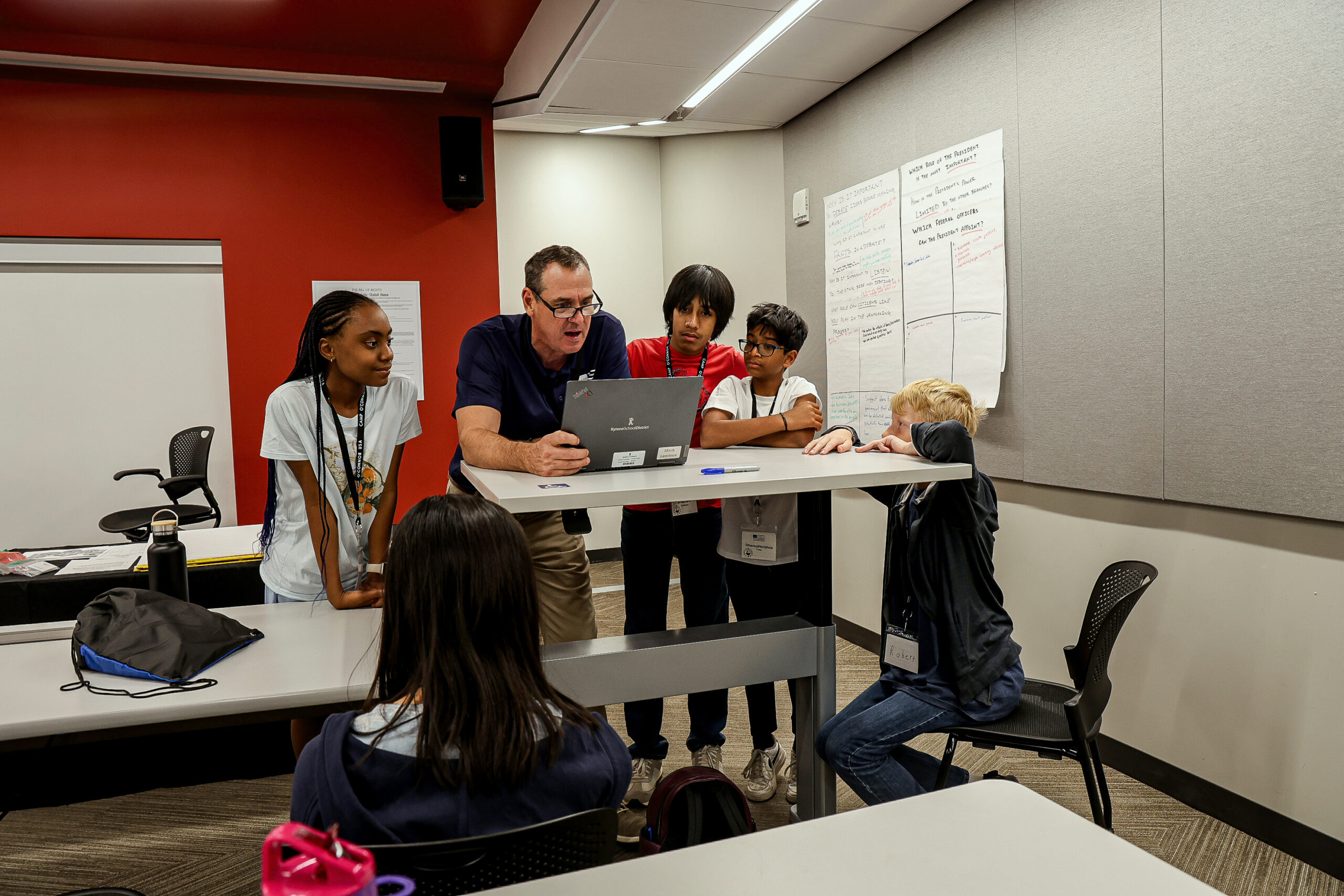
Mark Lemieux, a counselor at Camp O’Connor, reviews a campaign speech written by campers. (Photo by Joshua Harrison-Williams/News21)
The camp is funded by donations and grants, Maynard says, and cost $1,200 to $1,500 per student this year. That covers counselor salaries, some meals and buses for field trips. Students attend for free, but they’re responsible for lodging and travel to and from Phoenix.
A report by researchers at Georgetown University found that participants in a similar civics camp in 2019 saw improvements in their knowledge of history and civics.
Maynard says Camp O’Connor doesn’t have a formal way of tracking campers after they leave, but he does point to one marker of success.
“If we have a student come here that doesn’t remember exactly everything that was said on ‘Executive Day,’ but they go back to their school and they want to be part of their student council, that’s a win,” Maynard says. “That’s someone who has become engaged with their community, and that’s likely someone who will continue to stay engaged as they get older.”
‘Prepared to take action’
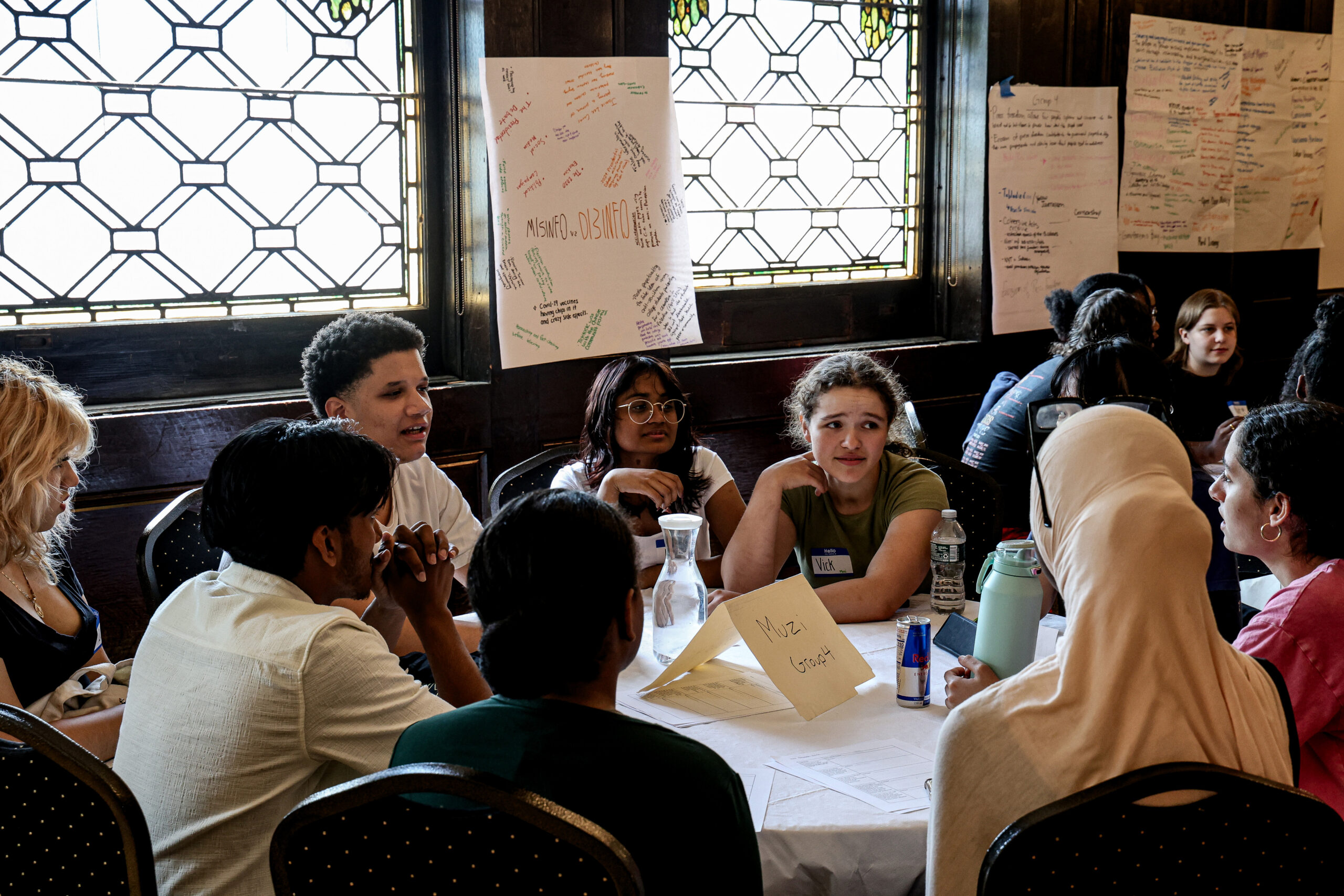
Campers at YVote’s Democracy Camp discuss issues affecting the country at the New York Society for Ethical Culture in New York on Monday, July 1, 2024. (Photo by Emily Richardson/News21)
A few weeks later and 2,500 miles away, young people dive into democracy in a different way.
YVote was founded in 2017 by New York high school students worried about low voter turnout among youth and a lack of civics education. The core premise of the group’s camp is that democracy is flawed – and young people have a duty to help fix it.
“There’s space to be better,” Elkouraichi says. “If people my age continue to be civically active and politically active, then I’m hopeful that there’s going to be an upward climb.”
On day four of this summer’s five-day camp, the question posed by a facilitator resonates: “What is my role in an ideal democracy?”
The room falls quiet. Students reach for pens and start writing answers in their journals, illustrated with stickers and doodles.
The exercise is more than a philosophical query. Over the next year, each camper has to plan and execute a democracy project that they will take back to their boroughs.
Earlier in the day, they hit the streets to canvass strangers, heading to Central Park and the Upper West Side, with skyscrapers and yellow cabs in the background of their conversations.
At Columbus Circle, Cisse and her project partner ask people about gender inequality.
One woman rants for half an hour, taking drags from a cigarette as she recounts power imbalances she has faced with men. Another suggests the students create courses for their classmates on self-defense or respecting boundaries. And two sisters visiting from Bangladesh say they receive unsolicited comments on the street nearly every day.
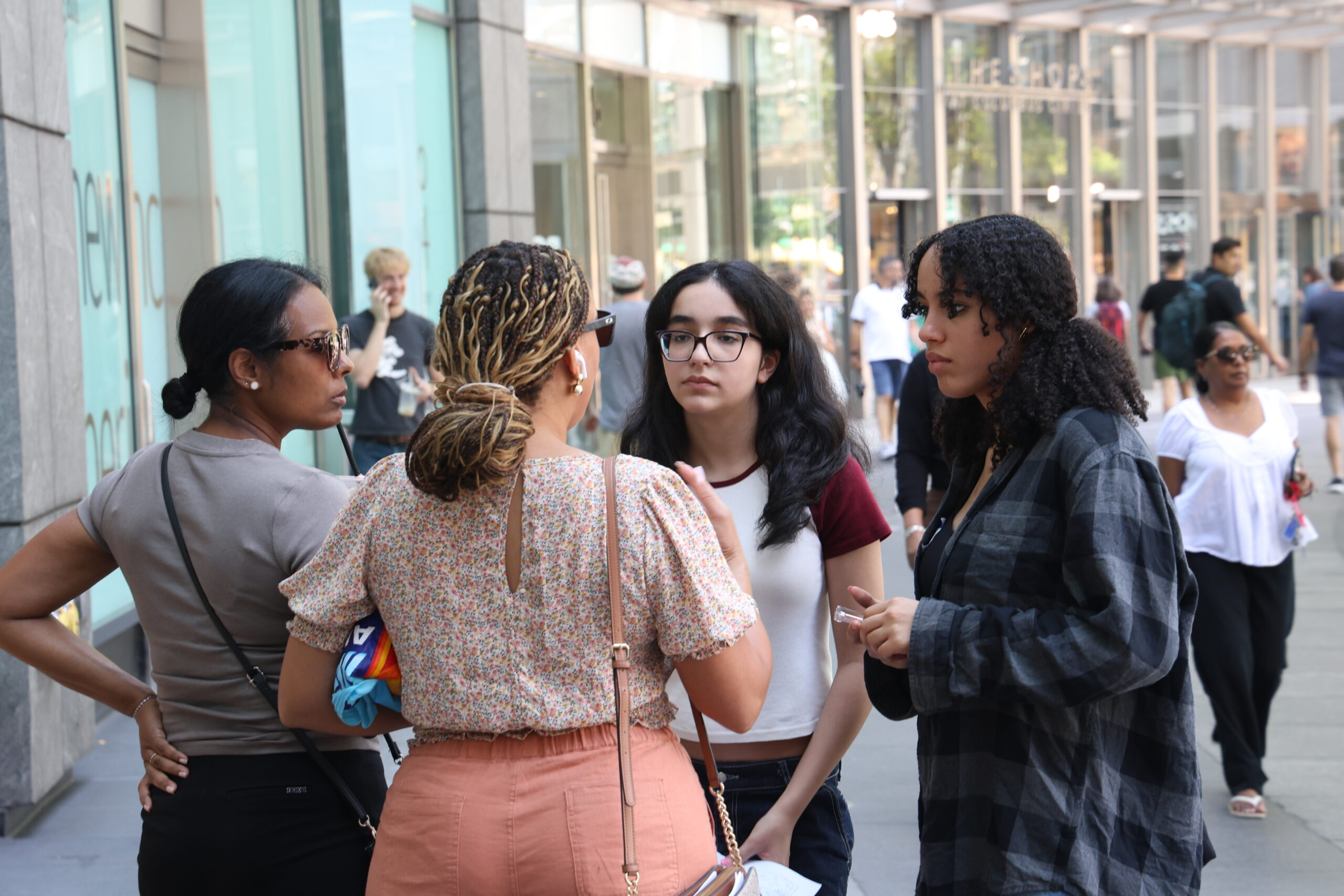
Students Talia Arcasoy, left facing the camera, and Olivia Cisse, right, interview people in New York’s Columbus Circle on July 2, 2024, as part of YVote’s Democracy Camp. (Photo by Emily Richardson/News21)
Cisse, a junior at Stuyvesant High School in lower Manhattan, says she chose the subject because she is sick of hearing derogatory remarks about women at school.
“It’s so normalized,” she says. “I feel like people then feel uncomfortable and feel like they can’t speak up about it, because nobody does.”
Cisse and fellow camper Talia Arcasoy believe women being comfortable and respected in the workplace is an important part of democracy. They walk away excited by the idea of creating workshops for their final project.
That’s why the youth-led camp exists, organizers say: to inspire young people to take action.
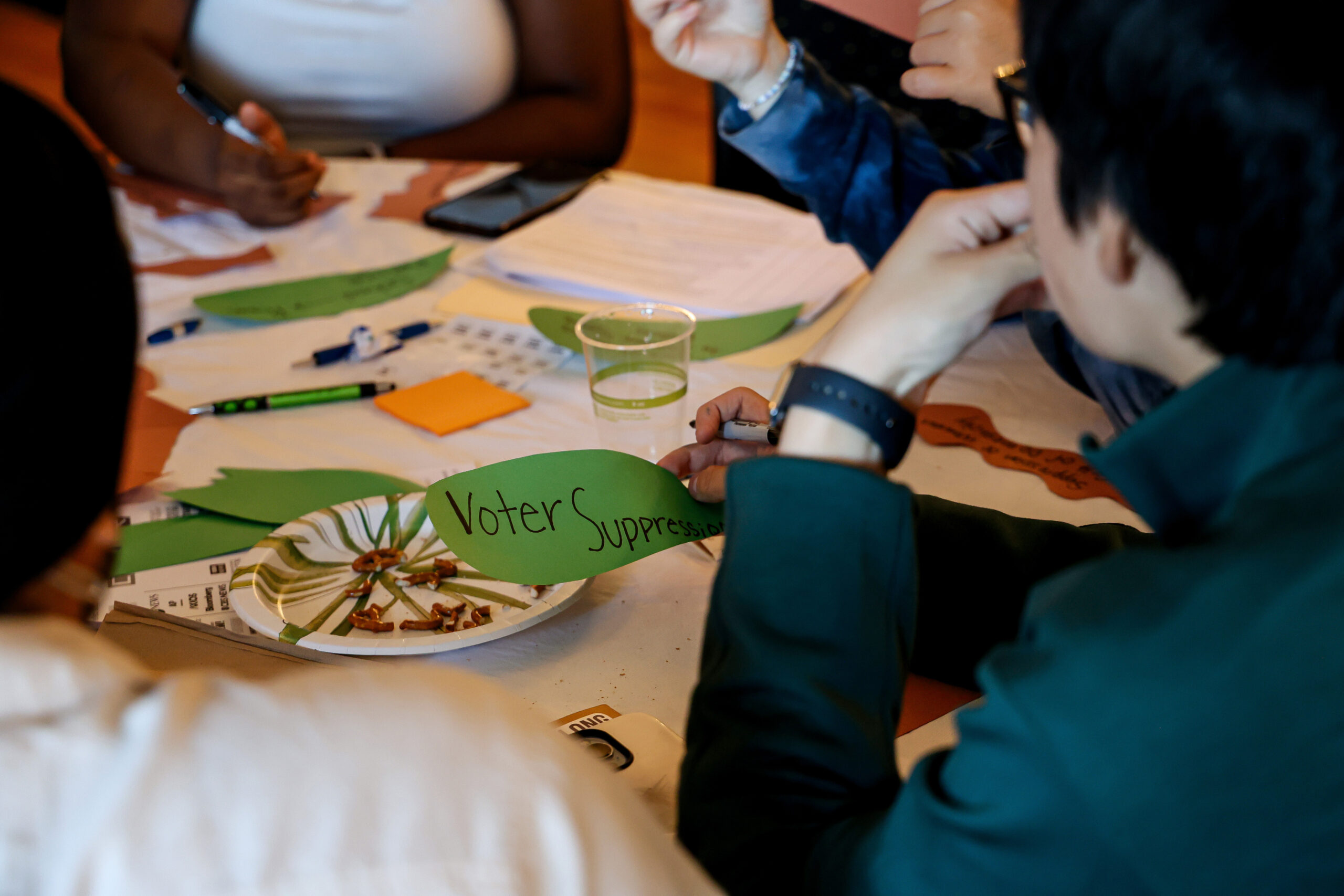
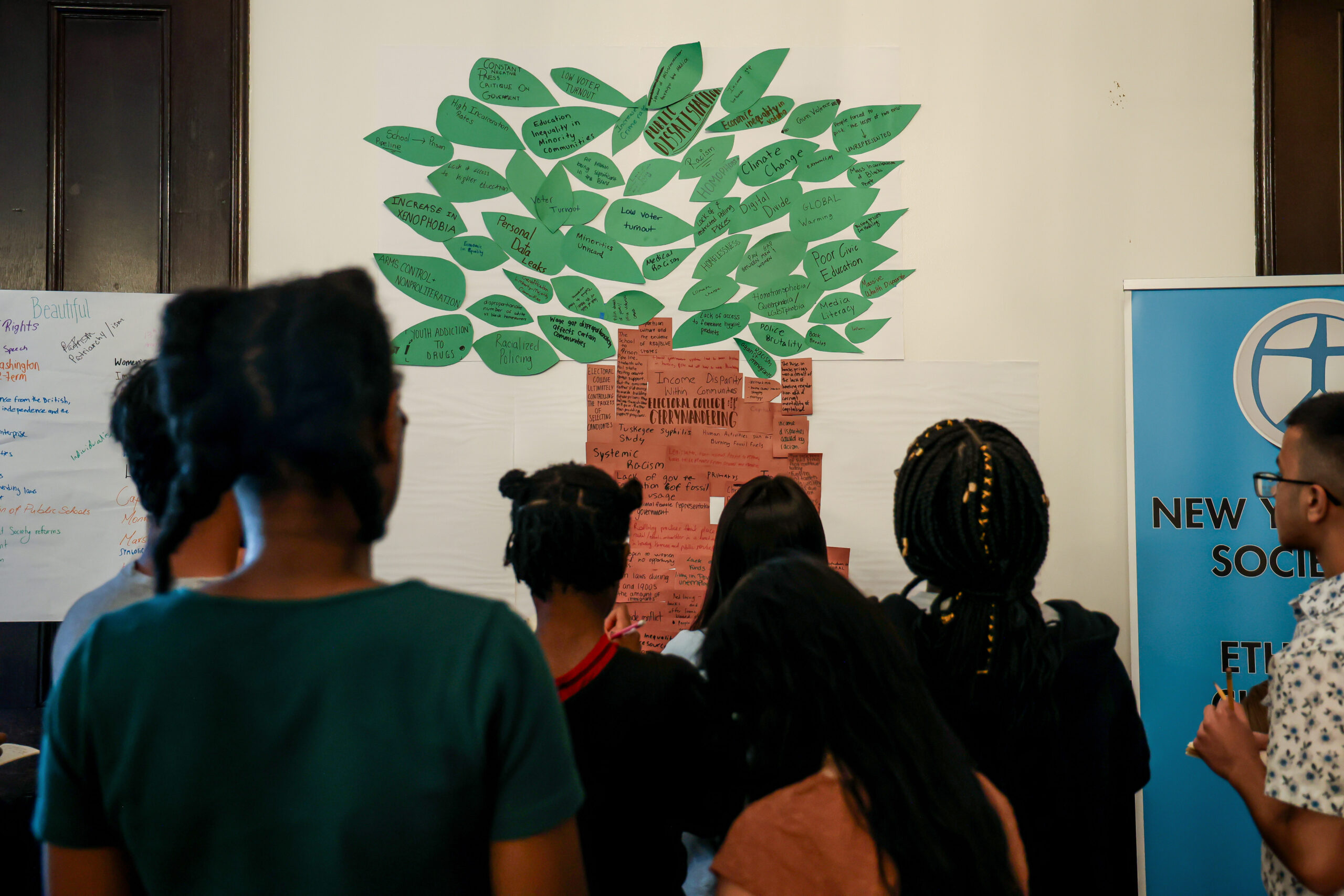
Left: A student works on a leaf for the “Democratree” at YVote’s Democracy Camp. The project visualizes how modern day issues — written on leaves — trace their origins to historical root causes. Right: Students examine the “Democratree” at YVote’s Democracy Camp. (Photos by Emily Richardson/News21)
“We care a lot about what people do beyond voting,” says Sonja Aibel, 17, a YVote leader. “Even if we have participants who come away from the program not convinced that voting is the right choice for them, they’re still prepared to take action beyond that.”
A 2022 report by the Brennan Center for Justice found that young people engage in democracy in ways not often recognized, including volunteering, donating money, boycotting and community service.
More than 30% of Americans ages 18-29 have signed a petition or joined a boycott, and about 15% have attended a protest, demonstration or march, according to data from CIRCLE. However, survey respondents who were interested in civic engagement said they often lack information, support and opportunities.
The New York camp offers each student a $250 stipend for the week and another $250 once their projects are completed. The stipend is meant to broaden access, says Chris-Ann Barnett, YVote’s associate program director.
“They don’t have to worry about the cost of getting here” or “spending a week doing something that’s not paying them,” she adds.
In New York state, high school graduates can receive a Seal of Civic Readiness on their diplomas to recognize proficiency in civic knowledge, skills, mindset and experiences. Students earn points by doing things such as taking electives that promote civic engagement.
Two of this year’s YVote campers attend a school in Manhattan that confers the seal. Organizers plan to reach out to ensure the students get credit for their final camp projects, and they hope other schools will follow suit.
Research from CIRCLE shows that big metropolitan areas such as Phoenix, Washington, D.C., and New York are more likely to have access to the best civics education. During the 2020 presidential election, two-thirds of teens surveyed expressed interest in learning about the race, but a third of them didn’t have access to a course about U.S. government and institutions.
Rural teens whose parents were less educated faced even more difficulty accessing such courses, research showed.
‘We want to support democracy’
The federal government doesn’t mandate civics education, and a 2022 report by the American Bar Association found only 38 states – New York among them – require some form of civics courses in schools.
The controversial No Child Left Behind Act of 2002 prompted a national fixation on standardized testing and less emphasis on subjects those tests don’t cover. This, coupled with pandemic-related learning loss, led to lost instructional time for social studies and civics, experts say.
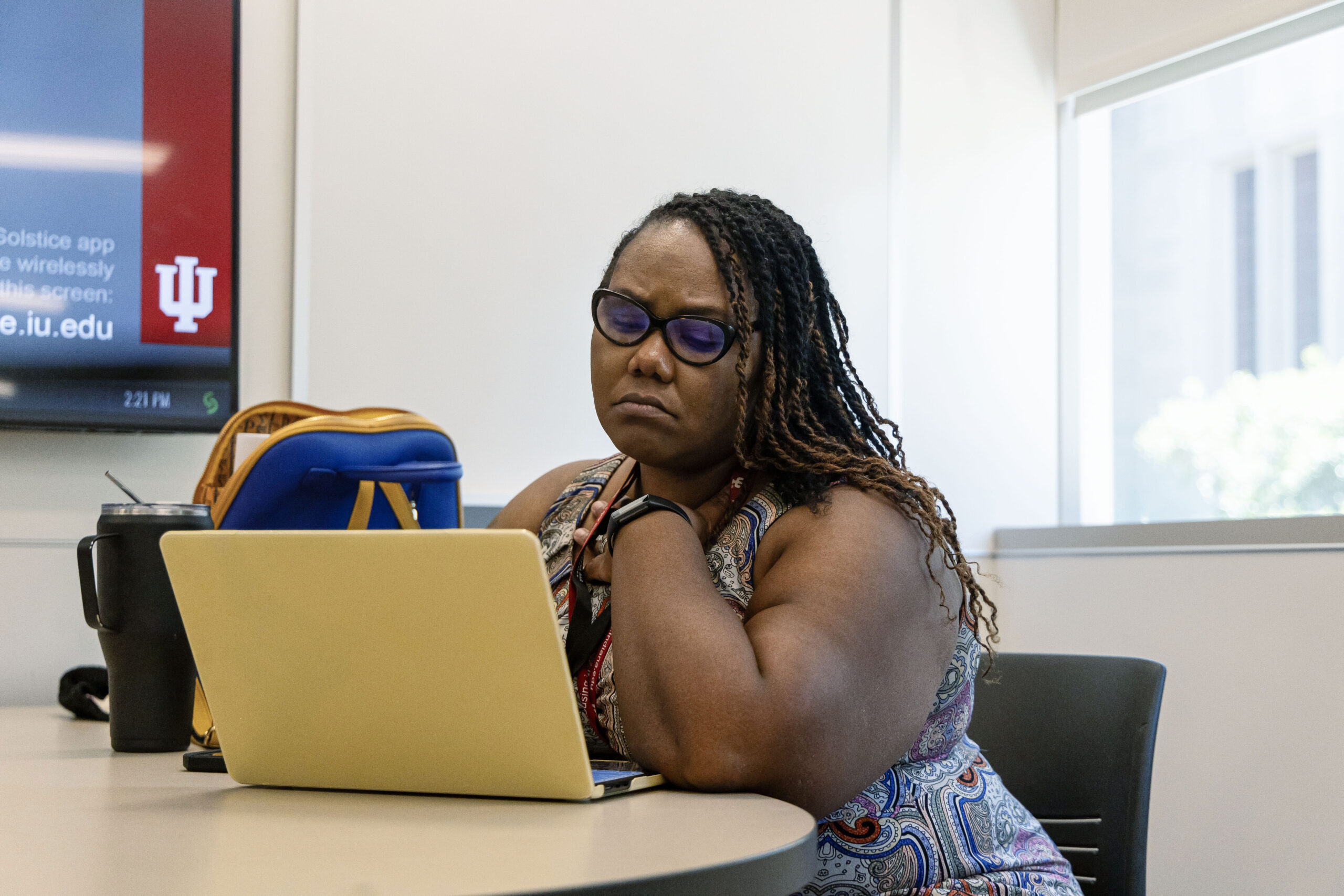
TaShena Melton, a teacher at Calumet Christian School in Griffith, Indiana, attends a civics education conference in Bloomington, Ind., on June 24, 2024. (Photo by Hannah Lee/News21)
Schools have “focused a lot more on pushing math, science and reading, (and) because of that, social studies kind of falls to the wayside,” says Brianna Diaz, who wrote a report about the change in civics education for Children’s Defense Fund Texas. “Teachers mentioned that they lost instructional time … because other things, the school decided, should be a priority.”
For those trying to build a curriculum, the nonprofit Center for Civic Education provides model programs for various grade levels to a network of teachers and students across the country. It also provides teacher training, such as an event overseen by the Indiana Bar Foundation in June.
About two dozen social studies, history and government teachers from across the state convened at Indiana University Bloomington to learn how to improve their civics teaching skills.
They listened to presentations about trust in elections and the origin of the Civil Rights Act. They workshopped lesson plans and brainstormed how to explain difficult subjects such as slavery or contentious elections.
TaShena Melton, who has taught for nine years at Calumet Christian School in Griffith, Indiana, recalled preparing a lesson for students in 2018 on the value of bipartisanship.
Melton showed her students a video of former President Barack Obama’s eulogy for Republican Sen. John McCain. Before he died of brain cancer, McCain invited his 2008 presidential rival to speak at his funeral.
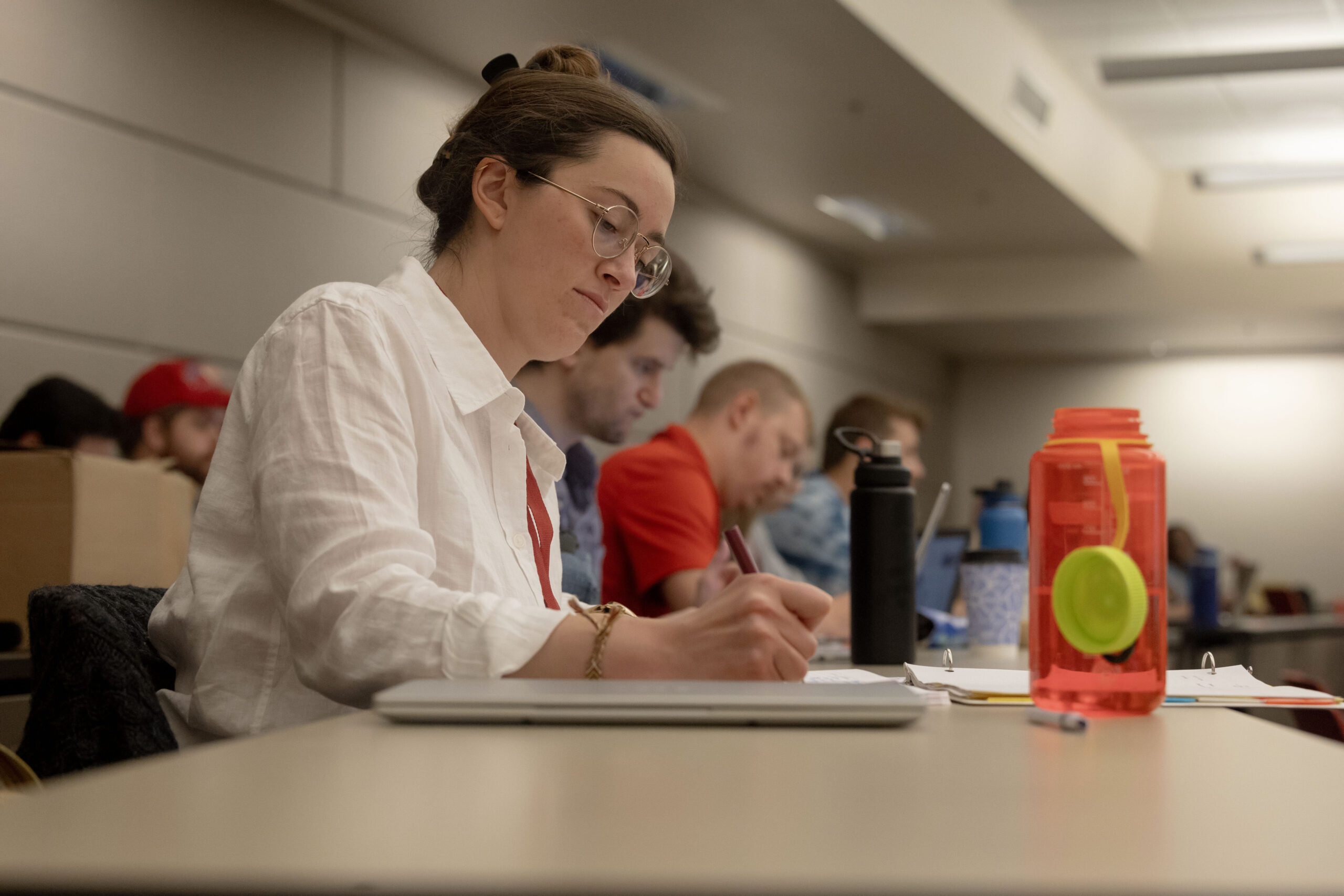
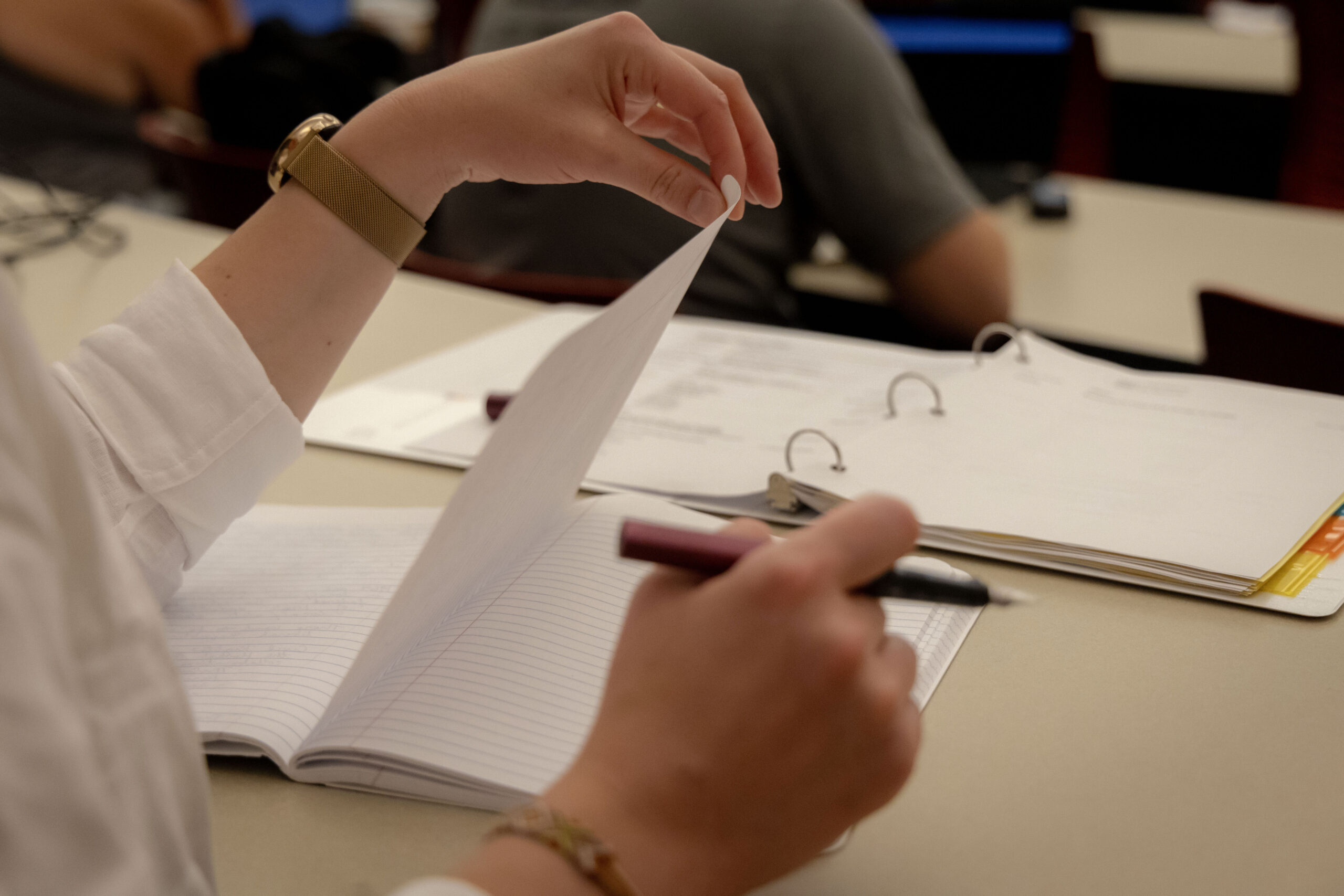
Left: Lillian Cardwell, a teacher at St. Richard’s Episcopal School in Indianapolis, takes notes during a civics education conference in Bloomington, Ind. Right: Cardwell looks over her notes. (Photos by Hannah Lee/News21)
Melton told her class that even though the two had competed for the highest office in the land, they still respected one another.
Her students responded with their thoughts about McCain’s decision.
Liar. Cheat. A traitor to his own party.
“I ran out of words to try to explain how I felt at the end of that class. That was probably when I almost lost hope,” Melton says. “Teachers as a whole, we’re struggling with how to deal with students who have a jaded view” of democracy.
Plainfield High School teacher Adam Ferguson acknowledged in one session that teachers often do not take college courses or get training about how to handle controversial issues. His advice: Don’t avoid the conversations, and don’t call them debates. Use the word “discourse,” because it’s more thoughtful.
Even as some educators, political leaders and academics voice support for civics education as an ideal, tensions are growing over its execution.
Some fear civics learning can veer into indoctrination. Civics Alliance, a coalition of conservative individuals and groups, advocates against what it calls “action civics” in favor of standards that “teach American students their birthright of liberty.”
Action civics, the group says on its website, “replaces classroom civics instruction with political commitment, protest and vocational training in progressive activism.”
States across the country have pushed policies that limit or outright ban things such as critical race theory. The governors of Virginia and South Dakota in 2022 administered executive orders banning critical race theory in the classroom.
Also in 2022, Florida lawmakers prohibited classroom instruction from being used to “indoctrinate or persuade students in a manner inconsistent with certain principles or state academic standards.” Specifically, the law forbids teaching any of eight “specified concepts” related to “race, color, sex, or national origin.”
Some young people wade through all the voices, saying they just want space to learn.
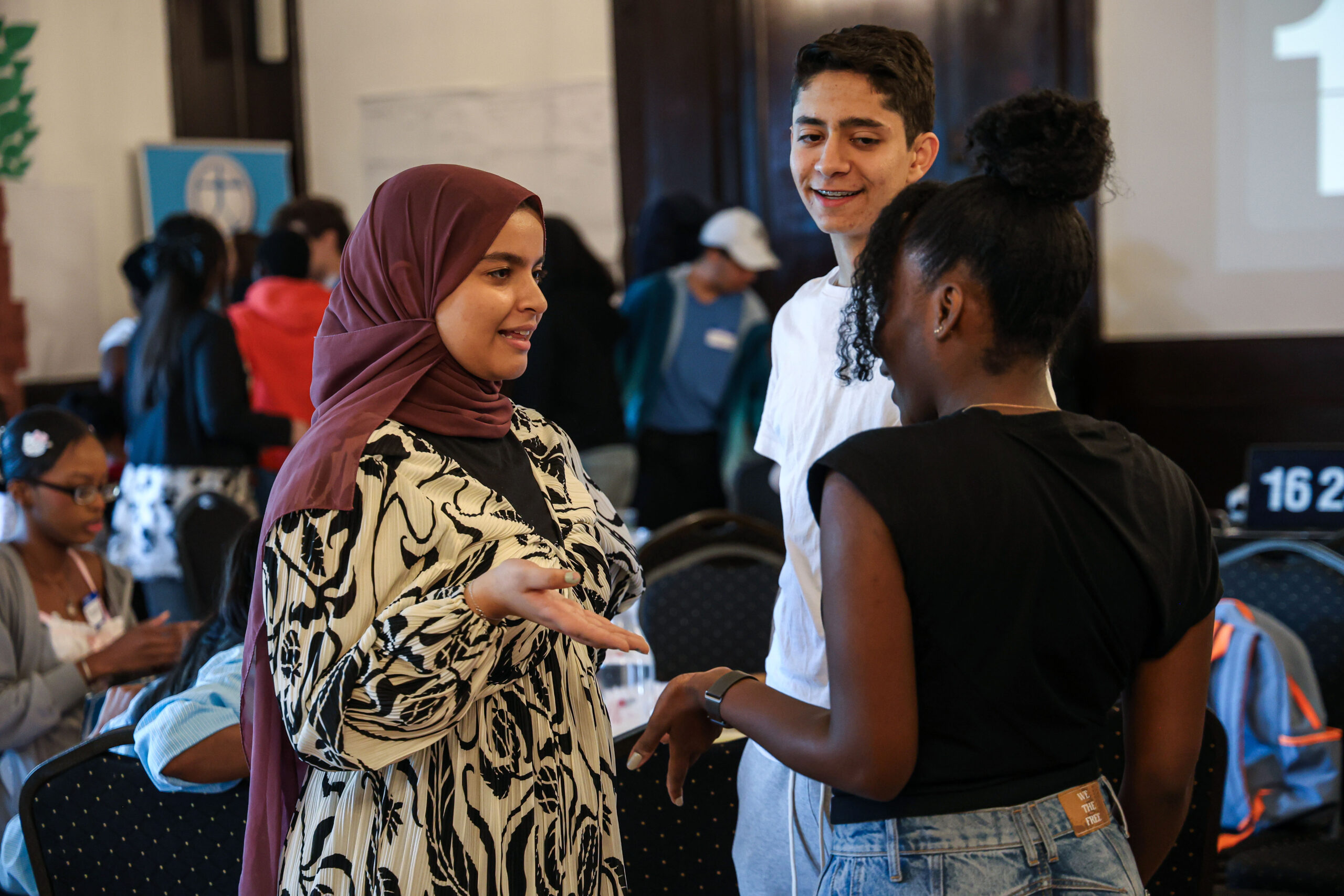
Heba Elkouraichi, left, Michael Nisimov, middle, and Chris-Ann Barnett, right, confer at YVote’s Democracy Camp in New York on July 1, 2024. Elkouraichi, 16, says young people do care about democracy. “But in reality, we just don’t feel included.” (Photo by Emily Richardson/News21)
“We want to give young people the opportunity to learn about politics and learn about civics and learn about how to maintain democracy without feeling like they have to stick to one side of the spectrum,” YVote’s Elkouraichi says. “You can have your views, but you can also work with the greater population toward having everyone’s voice heard.”
News21 reporters Joshua Harrison-Williams, Hannah Lee and Vivian Serafin contributed to this story.
More News from Raritan
- Broadway's The Lion King Actress Tragically Murdered in Edison, NJ On December 21, 2025, at 9:18 A.M., authorities received a 911 call reporting a stabbing.
- School Psychologist Melissa Norrbom Selected as Educational Services Professional of the Year at Somerset County Vocational & Technical High School Dr. Norrbom has been a school psychologist for eighteen years and has been on the staff at SCVTHS for eleven of those years.


